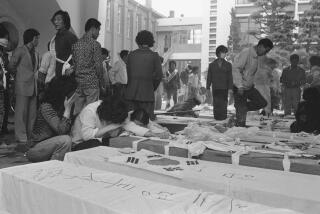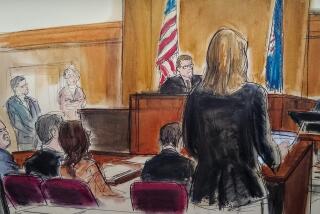Dotson, Webb Questioned by Gov. Thompson
CHICAGO — Convicted rapist Gary Dotson pleaded with Illinois Gov. James R. Thompson to end his “nightmare” of imprisonment, and his original accuser called her tale of being raped eight years ago “a big lie” as they testified Thursday at an extraordinary clemency hearing.
Cathleen Crowell Webb said that she wanted “simply to tell the truth about a deception that sent an innocent man to jail for six years.”
But Thompson, saying that he was engaged in “a search for the ultimate truth,” would not be rushed. He questioned Webb closely for nearly four hours in the afternoon after Dotson testified for 2 1/2 hours at the morning session.
The unusual emergency hearing of the Illinois Prisoner Review Board, televised live on Cable News Network, was recessed after Thompson completed his questioning of Webb.
Webb to Face Board
When the hearing resumes today, Webb will answer questions from the 10 members of the board, which will make a non-binding recommendation to the governor on Dotson’s clemency petition.
A list of 16 potential witnesses remains to be called, including childhood friends of Webb, her foster parents, one of Dotson’s original alibi witnesses and police officers who investigated the original case.
Thursday’s session, the first clemency hearing personally attended by Thompson in his eight years in office, was the most dramatic show yet in the puzzling recanted rape case. Held under spotlights in the auditorium of the State of Illinois Center, which opened officially only this week, it featured the two principals in the case--23-year-old Webb and 28-year-old Dotson, now free on bond--being questioned by the governor, himself a former prosecutor.
Webb, whose testimony six years ago persuaded a jury to convict Dotson of rape and aggravated kidnaping, came forward two months ago, saying that she had lied about being raped the night of July 9, 1977, in a Chicago suburb. She said that she wanted to set the record straight and would not stop until Dotson was set free.
Conviction Motion Denied
But in April a motion to vacate Dotson’s conviction was denied. He has a motion pending for a new trial.
The governor is empowered under Illinois law to pardon Dotson or commute his sentence, and Thompson said that he decided to attend the hearing because the case rests on the credibility of witnesses and has called into question the state’s criminal justice system.
Dotson, dressed in a cream-colored suit and gray tie, was called first. Reading from a prepared statement, he said that since his arrest in 1977, he had “told anybody who would listen that I was not guilty of this crime.”
“But I had made nothing of my life,” he said, noting that he was frequently involved in “mischief” as a teen-ager, “and no one was willing to believe me.”
“I believed my innocence would be shown eventually,” he testified. “But after three years in prison, I gave up. I thought it was hopeless.”
Hopes Raised
His hopes were raised, he said, when Webb announced that she was recanting her trial testimony. “That day was so important . . . she had finally admitted I didn’t rape her,” he said.
“But I’m still fighting. This nightmare doesn’t seem to end.”
Thompson took Dotson step by step through the story he told at the trial and again at last month’s court hearing. Dotson denied ever knowing or seeing Webb, then 16-year-old Cathleen Crowell. He testified that he had been driving around with two friends on the night of the reported rape. They stopped at two houses, where parties were in progress, Dotson said, but he remained in the back seat and slept.
Thompson asked Dotson about his 2 1/2-page police record, which included one conviction for theft and a string of vandalism allegations.
Then Webb went before the microphone and said she “would like to apologize for my past mistakes that have caused so many problems.” Describing herself as a sexually promiscuous teen-ager, a frequent liar and “a real handful” for her foster parents, she said that she had made up the rape story because she was afraid that she was pregnant after having sexual intercourse with her boyfriend a few days earlier.
Questions Tough
Before questioning her, Thompson said that his queries were meant as “a search for the ultimate truth no matter what has gone before, no matter what has been said before.” His questions were tough and pointed and at times the governor appeared to find elements of her story too far-fetched to believe.
Webb testified that she lied in 1977 and at the trial in 1979 because she was worried that her foster parents would be so upset if they learned of her promiscuity that they would order her out of their home.
Her decision to recant, she said, came after she became a Christian in August, 1981, at a Baptist church in Jaffrey, N. H., the town where she now lives with her husband, David, and two small children. When asked why she had waited more than three years to come forward, she said: “I had to grow in faith and in my trust in Him (God) before my faith overcame my fears about the consequences.” Among her fears, she said, was that “I didn’t think anybody was going to love me after that.”
The governor questioned Webb extensively about her identification of Dotson, who she said she picked out of a handful of photographs shown to her by police because he so nearly matched the drawing a police artist had made from her description.
Asks About Police Lineup
At one point, Thompson walked from the Prisoner Review Board table to the witness table and sat next to her to ask her about the police lineup in which she had tentatively--but not positively--identified Dotson’s best friend as looking like one of the three men in the car the night of the rape.
She said that she picked the friend out of the lineup because police officers had earlier shown her a picture of him and told her that he was Dotson’s friend, and because he fit the description she had given police of a passenger in the car.
While Webb’s opening statement seemed assured, she seemed less confident when answering the governor’s questions. She told of how she had scratched her abdomen with a broken beer bottle, scratched her vagina and torn her own clothing to make it appear that she had been raped. She said that she had intended to go home and tell her foster parents, assuming she could talk them out of calling the police. But that plan was ruined when a police officer on patrol spotted her, crying, near a local park.
More to Read
Sign up for Essential California
The most important California stories and recommendations in your inbox every morning.
You may occasionally receive promotional content from the Los Angeles Times.











